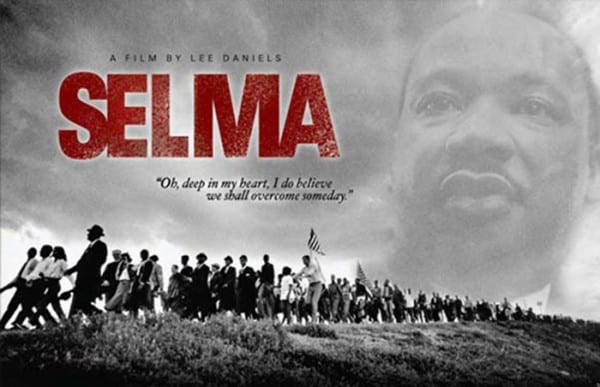STEVEN JONAS

MLK with LBJ. Recreating history—truth (l) and simulation (r). How close did the two come in Selma, the film? (Photomontage for Slate Magazine)
[dropcap]Weren’t[/dropcap] the valiant, courageous actions of civil rights advocates a triumph for social justice? Did it not lead to further advances in that struggle? And if you are referring to the movie, is it not a triumph as well, getting a film that portrays one of the signal struggles of the Movement during the 60s with such searing honesty, no holds barred in dealing with the “Which side are you on?” question, applied to this event?
Well, yes, the Selma March was a triumph for the civil rights movement. It played a very important role in getting Lyndon Johnson to support what became the Voting Rights Act. It did lead to further advances in that struggle. The movie is a triumph as well, a brilliantly staged and acted docudrama which, among other things, uses the real Edmund Pettus Bridge in Selma, Alabama, as the setting for the real march that took place across it in 1865.

Produced by Oprah Winfrey, and directed by Ava DuVernay, the movie has received accolades in many quarters, but some critics contend it left too much inconvenient history on the cutting room floor. (Harpo/Paramount)
Ironically enough, the bridge is named for a Confederate Brigadier General, who later, operating out of his law office, became the leader of the Alabama Ku Klux Klan in Selma and went on to become a U.S. Senator from Alabama. This is particularly ironic in the context of the Voting Rights Act and the struggle to enact it. The Ku Klux Klan was founded very shortly after the end of the civil war by an association of ex-Confederate generals, planters, certain Democratic politicians, and other white leadership who wanted to return the civil society in the South as much as possible to what it had been before the Civil War, with the exception of not having the institution of chattel slavery in place.

D.W. Griffith kicked up a thunderstorm through his cinematically ambitious but perversely racist classic, The Birth of A Nation (1915). Despite boycotts, Birth of a Nation remains one of the most profitable films ever made. Race continues to be a touchy and extremely difficult subject for just about any director.
One of the principal objectives of the Klan, from the earliest days of its founding, was to prevent the newly freed slaves from exercising the right to vote that had been granted to them by the 14th (1868) and 15th (1870) Amendments to the Constitution. The language of the latter is particularly instructive: “1. The right of citizens of the United States to vote shall not be denied or abridged by the United States or by any State on account of race, color, or previous condition of servitude. 2. The Congress shall have power to enforce this article by appropriate legislation.”

A “justified lynching” as depicted in Birth of a Nation. The victim to be hanged is a white actor in blackface. (Wikipedia)
But with the power first of the Klan, with the ever-spreading denial of the vote to African-Americans, and then with the institution over a period of some years of what was called the “Jim Crow” laws by the Democratic Party in the South, African-Americans were indeed systematically denied the right that had being guaranteed to them by the 15th amendment.

By whitewashing and even glorifying the crimes of the KKK and the ideology it represented, Griffith gave a new impetus to racism in the US, especially in the South where the real Klan experienced a resurgence. (Public domain)
The reality that casts a shadow over Selma is that it did not end the struggle for civil and voting rights for people of color in the United States. As I pointed out in recent column, except for the literal abolition of chattel slavery, in terms of its central goals, the South essentially won the Civil War. It is a tragedy that one of the two major U.S. political parties still runs in part on racism, just as the old Southern Democratic Party did. The story of how Nixon took the “Southern Strategy” that had been originally invented, but not in a formal way, by Barry Goldwater, and broadly implemented it for the GOP, and how Ronald Reagan cemented it in place need not be re-told here.
Indeed it is a tragedy that the Voting Rights Act for which so many whites and African-Americans had fought so hard for so many years has been recently been gutted by the Republican Supreme Court. (That is the same Republican Court that may be on its way to gutting the Fair Housing Act as well.) It is a tragedy that indeed Martin Luther King’s words 50 years ago, about segregation and discrimination, about racism, about the lack of economic justice for non-whites (and now, of course, increasingly for many whites as well) still, as the Southern Poverty Law Center points out, cry our for justice to this day. Dr. King’s vision of a civil rights-labor alliance, which has never been achieved, echo down to us today as well.
At huge cost, the Civil War could control racism only de jure. On the cultural front the war continued, and the South was clearly the winner.

Oprah Winfrey’s role as producer has cast doubt on the political message of the film. Some have charged the film with deliberate distortion of important figures, such as James Foreman or SNCC’s Stokely Carmichael in favor of white liberals like the Kennedys. Others see an uncompromisingly honest depiction of the struggle. (Wikipedia)
It is a tragedy that voter suppression, aimed at African-Americans and other population groups who tend to vote for Democrats, has become an official policy of the Republican Party, under the guise of “battling voter fraud” (which happens to be virtually non-existent, and even if it weren’t could easily be dealt with by offering free, easy-to-obtain voter ID cards). It is a tragedy that lynching, a major tool of black-suppression in the Jim Crow South, which was dying out by the time of “Selma,” has returned to this country in the form of white police officers killing black young men at an astounding rate.
Now let us turn briefly to “Selma,” the movie. First, of course is the fact that when it came to Academy Award nominations (not the awards themselves), while the movie itself did receive one for Best Picture, the Director, Ava DuVernay, and the lead actor, David Oyelowo, who had received awards and nominations elsewhere were complete shut out. That is itself a legacy of racism, given the excellence of the film.
The bottom line, which really has been lost, is that the South did win the Civil War and one of our two major political parties runs on racism (as well as religious authoritarianism and the demonization of various “others”). These are two of the major issues facing this country just as they were back at the time of Selma. That is the bitter historical aftertaste of watching the triumph depicted in the movie.
The reality that casts a shadow over Selma is that it did not end the struggle for civil and voting rights for people of color in the United States. As I pointed out in recent column, except for the literal abolition of chattel slavery, in terms of its central goals, the South essentially won the Civil War [https://www.greanvillepost.com/2014/12/07/ferguson-worked-as-intended-for-the-maintenance-of-the-doctrine-of-white-supremacy-in-the-us/].
Lasting tragedy
It is tragic that one of the two major U.S. political parties still runs in part on racism, just as the old Southern Democratic Party did. The story of how Nixon took the “Southern Strategy” that had been originally invented, but not in a formal way, by Barry Goldwater, and broadly implemented it for the GOP, and how Ronald Reagan cemented it in place need not be re-told here.
And indeed it is a tragedy that the Voting Rights Act for which so many whites and African-Americans had fought so hard for so many years has been recently gutted by the Republican Supreme Court. (That is the same Republican Court that may be on its way to gutting the Fair Housing Act as well.) It is a tragedy that indeed Martin Luther King’s words 50 years ago, about segregation and discrimination, about racism, about the lack of economic justice for non-whites (and now, of course, increasingly for many whites as well) still, as the Southern Poverty Law Center points out [http://www.splcenter.org/get-informed/news/mlk-s-words-just-as-relevant-today], cry our for justice to this day. Dr. King’s vision of a civil rights-labor alliance, which has never been achieved, echo down to us today as well [http://theragblog.blogspot.com/2013/01/harry-targ-dr-king-and-civil-rights.html].
It is as well a tragedy that voter suppression, aimed at African-Americans and other population groups who tend to vote for Democrats, has become an official policy of the Republican Party, under the guise of “battling voter fraud” (which happens to be virtually non-existent, and even if it weren’t could easily be dealt with by offering free, easy-to-obtain voter ID cards) [http://www.truth-out.org/buzzflash/commentary/the-gop-s-grand-plan-centering-on-voter-suppression-and-gerrymandering]. And it is a tragedy, too, that lynching, a major tool of black-suppression in the Jim Crow South, which was dying out by the time of “Selma,” has returned to this country in the form of white police officers killing black young men at an astounding rate [https://www.greanvillepost.com/2014/12/07/ferguson-worked-as-intended-for-the-maintenance-of-the-doctrine-of-white-supremacy-in-the-us/].
Now let us turn briefly to “Selma,” the movie. First, of course is the fact that when it came to Academy Award nominations (not the awards themselves), while the movie itself did receive one for Best Picture, the Director, Ava DuVernay, and the lead actor, David Oyelowo, who had received awards and nominations elsewhere were complete shut out. That is itself a legacy of racism, given the excellence of the film.
The bottom line, which really has been lost, is that the South did win the Civil War and one of our two major political parties runs openly and shamelessly on racism (as well as religious authoritarianism and the demonization of various “others”). These are two of the major issues facing this country just as they were back at the time of Selma. That is the bitter historical aftertaste of watching the triumph depicted in the movie.
What is $1 a month to support one of the greatest publications on the Left?
People who give you the unadulterated truths that affect your life and the lives of countless people around the world, and the destiny of the planet itself? Just think for a moment: an insignificant sum for you can mean whether we continue to publish or go under. And if we go, who will speak for you? It’s that simple. Don’t take the alternative media—YOUR media—for granted. Sign up today for a simple, recurring donation of just $1. You can cancel anytime—and no hard feelings. That’s a promise.
![]()


